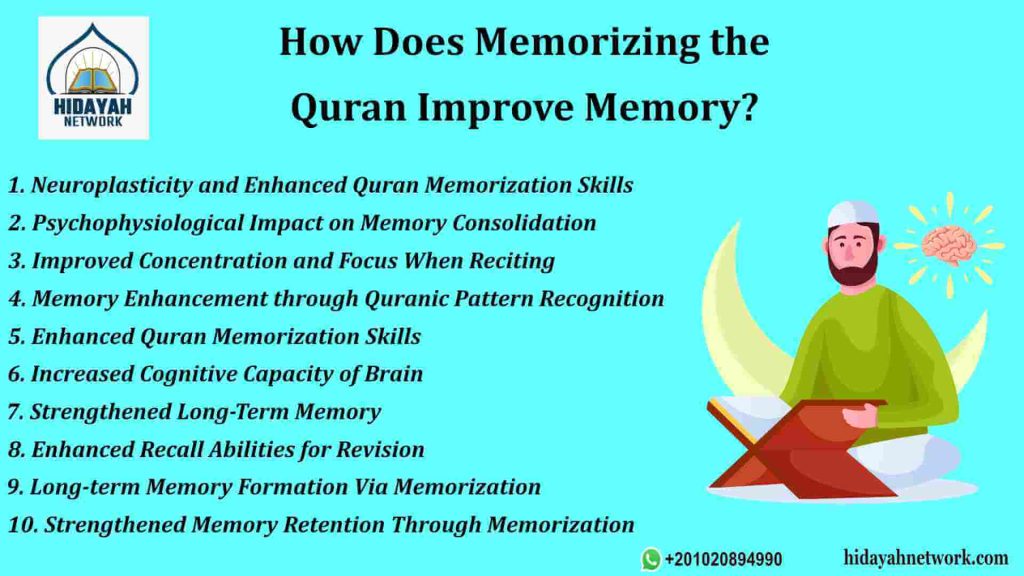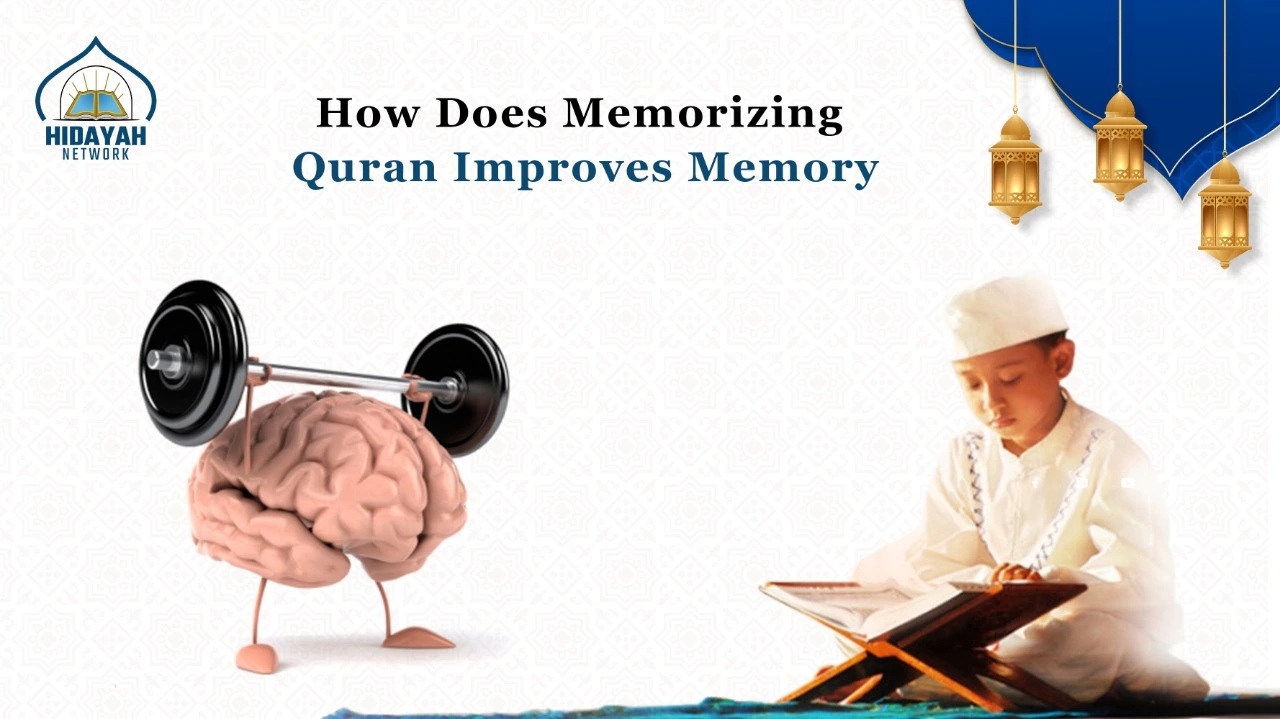Memorizing the Quran is a life-ling Ibadah as it needs revisions all the time. The more you revise the chapters, the better your memorization will become and it will strengthen your brain too. Here, we will show you how memorizing the Quran improves your memory tenfold.
Memorizing the Quran enhances the cognitive development of your brain. It improves memory consolidation, strengthens retention, enhances the ability of your brain to recall, and so on. Let’s study each of these impacts in more detail, understanding how different aspects of Quran memorization shape your brain for future and present development.
Table of Contents
Toggle10 Fats That Quran Memorization Improves Memory

1. Neuroplasticity and Enhanced Quran Memorization Skills
Quranic memorization fosters neuroplasticity in young minds. This means the brain’s ability to reorganize itself and form new neural connections is significantly enhanced. For instance, when children memorize verses with intricate Arabic scripts, their brain engages in complex pattern recognition exercises.
This process strengthens the synaptic connections responsible for memory recall. An example from the Quran that emphasizes the significance of memory is found in Surah Al-Baqarah (2:197):
“And take provisions, but indeed, the best provision is Taqwa (piety, righteousness).”
2. Psychophysiological Impact on Memory Consolidation
The psychophysiological impact of Quranic memorization on memory consolidation is profound. When children engage in the rhythmic recitation of verses, it triggers a relaxation response, reducing cortisol levels.
Lower cortisol levels enhance memory consolidation, making it easier for kids to retain what they learn. To aid memory consolidation during Quranic learning sessions, encourage a calm environment and incorporate gentle movements like swaying or rhythmic breathing.
Get 40% OFF Now!
3. Improved Concentration and Focus When Reciting
Quranic memorization fosters improved concentration and focus in children. The rhythmic nature of recitation, combined with the need for accurate pronunciation, demands their full attention.
To enhance concentration during Quranic learning, encourage a dedicated study space, minimize distractions, and use interactive methods. A practical tip for parents and educators is to break memorization sessions into short, focused intervals.
Additionally, consider the following points for effective concentration:
- Establish a quiet and dedicated study area.
- Use positive reinforcement techniques to keep children motivated.
- Introduce short breaks between memorization segments to maintain focus.
4. Memory Enhancement through Quranic Pattern Recognition
Quranic verses exhibit unique patterns, fostering memory enhancement in children. For instance, Surah Al-Fatiha follows a distinct rhythmic structure. Repetition of these patterns in memorization drills enhances a child’s ability to recognize and retain information.
Additionally, the Quranic verse (2:152) encourages gratitude: “So remember Me; I will remember you. Be grateful to Me, and do not deny Me.” This Quranic teaching aligns with the concept of memory enhancement through grateful recollection.
5. Enhanced Quran Memorization Skills
The primary benefits of memorizing quran for kids lie in the development of enhanced memorization skills. Learning the Quran involves committing intricate verses to memory, sharpening a child’s cognitive abilities. Consider the advice from Prophet Muhammad (peace be upon him), who said:
“
The Prophet (ﷺ) said, “The example of a believer who recites the Qur’an and acts on it, like a citron which tastes nice and smells nice. And the example of a believer who does not recite the Qur’an but acts on it, is like a date which tastes good but has no smell. And the example of a hypocrite who recites the Qur’an is like a Raihana (sweet basil) which smells good but tastes bitter And the example of a hypocrite who does not recite the Qur’an is like a colocynth which tastes bitter and has a bad smell.” Sahih al-Bukhari 5059
“
6. Increased Cognitive Capacity of the Brain
Engaging in Quranic memorization serves as a mental workout, actively increasing the cognitive capacity of a child’s brain. This exercise involves various cognitive functions, such as attention, language processing, and spatial memory.
Quranic memorization exercises the brain, expanding its cognitive capabilities. To foster cognitive growth in children:
- Encourage diverse activities beyond memorization, such as discussions on the meanings of verses.
- Introduce age-appropriate challenges to stimulate different areas of the brain.
- Utilize visual aids to enhance comprehension and memory recall.
7. Strengthened Long-Term Memory
The process of Quranic memorization plays a pivotal role in fortifying long-term memory, aligning with the profound wisdom embedded in the Islamic teachings.
As the Prophet Muhammad (peace be upon him) emphasized,
“The example of a believer who recites the Qur’an is that of a citron which tastes good and smells good.”
This analogy alludes to the enduring impact of Quranic recitation, akin to the lingering fragrance and taste of a citron.
8. Enhanced Recall Abilities for Revision
Quranic memorization not only strengthens long-term memory but also enhances recall abilities during revision. This is crucial for reinforcing what has been learned and ensuring its accessibility when needed. To optimize recall abilities during revision:
- Implement spaced repetition techniques.
- Encourage self-testing, where children recall verses from memory.
- Create a supportive environment for revision.
9. Long-term Memory Formation Via Memorization
- Scientifically, Quranic memorization contributes to the formation of long-term memories through a process known as synaptic plasticity.
- When children engage in repetitive memorization, it strengthens the synaptic connections between neurons, making the encoded information more resistant to forgetting.
- The brain’s ability to adapt and reorganize itself, known as neuroplasticity, plays a pivotal role in this long-term memory formation.
10. Strengthened Memory Retention Through Memorization
The process of Quranic memorization actively strengthens memory retention in children. It goes beyond rote learning by engaging different memory systems in the brain, including declarative memory responsible for facts and events. To enhance memory retention through memorization:
- Utilize storytelling techniques to make Quranic narratives more memorable.
- Connect memorization with real-life experiences, making the content relatable.
- Introduce interactive games that involve recalling and reciting memorized verses.
Does Quran Memorization Improve Your IQ?
Engaging in Quran memorization is associated with cognitive benefits that extend to intellectual capacities, including the potential for increased IQ. Scientifically, studies have shown that learning a new language, as is the case with memorizing the Quran in Arabic, positively impacts cognitive abilities.
The brain’s plasticity, its ability to adapt and reorganize itself, is stimulated during language learning, enhancing various cognitive functions. Moreover, the intricate nature of memorizing Quranic verses involves pattern recognition, auditory processing, and spatial memory—all contributing to cognitive development
Conclusion
These tips were meant to make Quran memorization lessons easily obtainable for learners and to help them enhance their memory by implementing these tips. We believe that it is the Quran that holds the learner in its miraculous blessings to help them keep it safe in their hearts. You are welcome to join our Quran Hifz classes to let your memory enhance with these easy tips.
Most Important FAQs
What happens to your brain when you memorize the Quran?
Memorizing the Quran involves various cognitive processes that can positively impact the brain. The process engages memory centers, stimulates neural connections, and enhances neuroplasticity. Regular Quranic memorization exercises can contribute to improved cognitive functions.
Do Hafiz have a good memory?
Yes, individuals who have memorized the entire Quran, known as Hafiz, generally have exceptional memory skills. Becoming a Hafiz requires the memorization of approximately 6,236 verses, a remarkable feat that demonstrates not only a strong capacity for memorization but also discipline and dedication.

About Author

